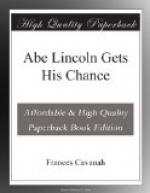Abe laid aside his knife, sat down on the rail fence, and pulled out his book. He took a piece of cornbread wrapped in a corn husk from his pocket. As he ate, he read, paying no attention to the conversation taking place a few feet away.
“Come and sit down, Tom,” said Carter.
Tom sat on a tree stump. Carter was being more friendly than usual. He was carrying a gourd full of ink, which he placed on another stump. He set down a deerskin bag, which jingled pleasantly with coins. In one pocket he found a turkey-buzzard pen. From another he brought out an official-looking paper.
“Here is the deed for the south field,” he explained. “Here’s a pen. I’ll hold the ink for you. You make your mark right here.”
“I don’t need to make my mark,” said Tom proudly. “I know how to sign my name.”
“Then hurry up and do it. Mrs. Carter has dinner ready, and I got to get back to the house.”
Tom took the paper and looked at it uncertainly. “I don’t sign any paper till I know what I’m signing. I want time to—to go over this careful like.”
He could make out a few of the words, and that was all. But not for anything would he admit that he could not read it.
“You told me you wanted to sell,” said Carter. “I said I would buy. I am keeping my part of the bargain. I even brought the money with me.”
Tom’s face grew red. He looked down at the paper in his hand. He glanced at Abe seated on the fence. A struggle was taking place between pride and common sense. Common sense won.
“Abe, come here,” he called.
Abe went on reading.
Tom raised his voice. “Abe! When I tell you to come, I mean for you to come.”
The boy looked up from his book with a start. “Yes, Pa. Did you want me?”
“Hustle over here and look at this paper. Carter is in a mighty big hurry for me to sign something I ain’t had a chance to read.”
“You have had plenty of time to read it,” said Carter. “But if you don’t want to sell, I can call the whole deal off.”
Abe reached out a long arm and took the paper. He read it slowly. “Pa,” he asked, “don’t you aim to sell Mr. Carter just the south field?”
“You know I’m selling him just the south field,” said Tom.
“Then don’t sign this.”
Carter picked up the money bag clanking with coins. He tossed it into the air and caught it neatly. Tom looked at it. He wanted that money! He looked at Abe.
“Why shouldn’t I sign?” he asked.
“If you do, you’ll be selling Mr. Carter most of your farm.”
John Carter was furious. “Don’t try to tell me a country jake like you can read! That paper says the south field, as plain as the nose on your face.”
“It says that and a sight more, Mr. Carter,” Abe drawled. “It says the north field, too. It says the east and the west fields. There wouldn’t be much farm left for Pa, except the part our cabin is setting on.”




